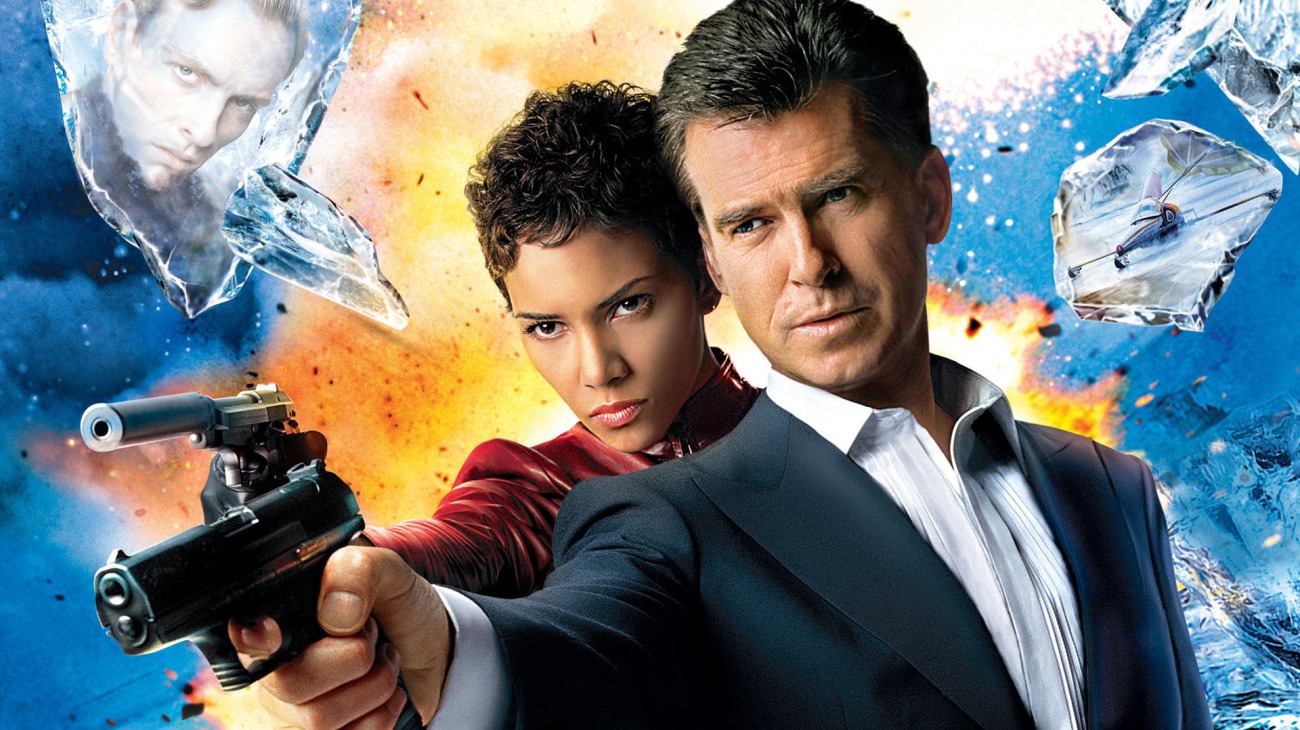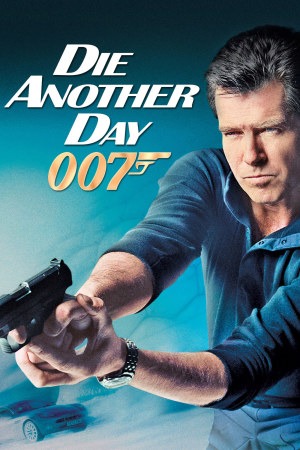
Bond scum
A guide to this blog's James Bond marathon can be found right here.
DIE ANOTHER DAY
Directed by Lee Tamahori
Written by Neal Purvis & Robert Wade
Premiered 18 November, 2002
PRE-TITLE SEQUENCE
After the operatic, 14+ minute opening to The World Is Not Enough, there was apparently some pressure to make the next one just as grand and big; for while it is well-known among fans of the series that TWINE has the longest pre-title sequence of them all, I don't believe it's quite as widely-known that Die Another Day, breaking the 13-minute mark, has the second-longest. And while, like its predecessor, the opening is the best part of the entire feature, this film's isn't nearly as good.
Off the coast of North Korea, a team of black-clad spies, led by Agent 007 (Pierce Brosnan) surf in to begin their as-yet unclear infiltration mission. And it will, I am truly sorry to say, remain important that James Bond knows how to surf.
Bond is in Korea to stop an arms deal in which renegade Colonel Moon (Will Yun Lee) - whose name is at the center of a protracted, film-long "Sun and Moon" metaphor that is, blessedly, never spelled out - gives up a whole mess of weaponry in exchange for a whole mess of conflict diamonds, which were just then a big thing in the news. All is going well, until Moon's right-hand man Zao (Rick Yune) receives a message from an unknown source that this alleged diamond smuggler is an agent of MI6. Bond flees, blowing up a case of diamonds in Zao's face, and there is a hovercraft chase across the Demilitarized Zone that ends with Moon dead, and Bond captured by the Koreans, subjected to God knows what torture.
Which is a hell of a ballsy way to start off your Bond movie, and points for that; points as well for the hovercraft chase, which is reminiscent in the best way of the truck chase from the end of Licence to Kill - among the best car chases itself in the whole franchise, I'll remind you. The chase in Die Another Day isn't up to that standard, but it's awfully damn good; sadly, it is reasonably short, and the sequence leading up to it is awfully chatty, and by Bond standards, unnecessarily expository. Just because it is a long sequence, alas, does not mean it is an exciting sequence, and though the slow build-up works, it is also slow.

Rating: 3.5 Union Jack Parachutes
TITLE SONG
Some Bond singers intuitively make sense. Tina Turner makes sense. Carly Simon make sense. Adele makes sense. Nancy Sinatra even makes sense, as much as I dislike "You Only Live Twice". Madonna does not intuitively make sense, and even if she did, she makes sense in 1987, not in 2002. For that was anyway not the most popular or aesthetically strong period of her career.
Anyway, the Madonna-written, Madonna-performed "Die Another Day", which bizarrely concludes that what the Bond franchise has been missing, really just desperately missing, is techno dance-pop. Not being a fan of the form, it's not fair of me to say that "Die Another Day" is, moreover, unusually bad dance-pop; but it is. There's a staticky, electric haltingness to the lines - for example, the opening, which I'd render as "I'm gonna / Wake up / Yes and / no" - that only makes sense in the context of designer drugs and pulsing lights, and has fuck-all to do with anything I'd associate with James Bond music: smokey sexiness, intensity, lyrics that mean anything, even on the dramatic but meaningless level of "He strikes! Like thunderball!" At one point, a propos of nothing, Madonna blurts out, "Sigmund Freud - analyze this, analyze this, analyze this". Yes, Sigmund. Please do.

Rating: 1 Shirley Bassey
TITLE SEQUENCE
The first, and probably only, of Daniel Kleinman's designs for the title that simply doesn't work for me. Part of it is the much-vaunted fact that, for the first time, we'd see footage of Bond (not just a Bondian silhouette, or a frightening transparency of Roger Moore) during the credits, in a sequence that actually advanced the plot; not a bad idea, but not as revolutionary as the producers seem to think (a montage of Bond being tortured isn't exactly a huge plot necessity), and as far as "communicating narrative in a montage that also doubles as naked women dancing around" goes, GoldenEye did it better. The tap-dancing scorpions that kick things off surely don't do the movie any favors.
The notion of various sexy naked women doubling as the implements of torture or the torturers themselves is a clever one - it can represent either Bond's attempt to deflect his pain by fantasising about sex, or about his notorious, rapacious past coming back to make him pay for his sins - though the decision to represent every one of them as either a block of ice or a living flame is a tad bit silly, and it reminds one of A View to a Kill, and that is a poor thing of which to be reminded.

Rating: 2.5 Silhouetted Women
THE PLOT
14 months later...
It's a prisoner exchange! The bearded, gaunt Bond, for none other than Zao, with diamonds embedded deep in his skin, and an acidic hatred for the man who put them their in his soul. Now, Bond is not terribly glad to be free - he knew the risks, and hates that his freedom came at the expense of Zao being out in the world - and M (Judi Dench) quite tartly agrees, stripping his 00 status until it can be determined what happened while he was in prison. That's of only limited concern to the spy, who is anxious to capture the North Korean thug, and will do it under MI6's auspices or not, doesn't matter (further hints of Licence to Kill).
This leads Bond to Havana, where he meets the mysterious "Jinx" Johnson (Halle Berry), who turns out to also be after Zao, presently hiding out in a clinic that uses DNA replacement therapy to completely alter anyone's appearance - Zao himself is halfway through the process of being made to look Caucasian, a perfect disguise that would make him untrackable, if only Jinx hadn't blown things up first (she proves to be an NSA agent). His curiosity piqued not only by this mysterious fighter, but also by the oddly-inscribed diamonds he finds in Zao's belongings, which he finds to have a tiny "GG" inscribed on them - the mark of foreign-born British billionaire Gustav Graves (Toby Stephens).
Now, I had not seen this movie in many long years, and I remembered hating it; up to around this point, I couldn't for the life of me figure out why (or rather, I didn't remember liking any of it nearly this much). Some of the dialogue and most of the exposition is awfully stiff, and Lee Tamahori's directing has already raised its obnoxious head - I'll have plenty to say of Mr. Tamahori's work soon enough - but it's a reasonably interesting and fast-paced riff on the Licence to Kill scenario that, unlike Licence to Kill, doesn't feel like it's abandoned being a Bond movie.
The moment things change is after the break-out from the clinic, when all of a sudden it becomes clear that after 50 minutes, we really haven't even tasted the plot yet; it's just been a big long intake of breath, the movie flexing its muscles for the actual conflict about to begin. Setting aside my general mistrust of false first acts, Die Another Day suffers for a much greater reason: the plot, when it happens, is fucking goddamn nightmare awful. I'm sorry, that was a touch extreme. It's hard to say when the unforgivable twist happens: if it's when an unofficially reinstated Bond gets his invisible car from Q (John Cleese), or if it's when Graves is introduced skydiving to "London Calling", a perfectly wonderful song that should never, ever, in all of history, have been found in a James Bond movie. Anyway, this sleeker variant on Licence to Kill quickly becomes a cloddish re-do of Moonraker, because it turns out that Graves, from his remote Icelandic ice palace, is preparing a huge space laser that reflects the sun's light and destroys everything; and he doesn't even have the decency to hold the world for ransom to do this, but is motivated by sheer mad revenge: for it turns out that Graves is none other than Col. Moon, on the backside of the same kind of makeover surgery that Zao was unable to complete.
I have glided over the many scenes in between "London Calling" and "race against the sun-laser, controlled by a giant vest that Graves has to wear for some reason", but they are the meat and potatoes of why the film is so grindingly bad: a long, pointless stopover in a fencing club; a long, pointless waiting game in the ice castle for everybody - including, as our last principal, Rosamund Pike as Miranda Frost, Graves's assistant who is secretly an MI6 agent who is secretly a traitor - to start fighting and not just wonder when the sun-laser is going to happen. A long pointless stopover altogether, in fact, reminding one of the very worst of the Moore years only magnified, and thrown into harsh relief by the general success of the opening part.

Rating: 1.5 Stolen Nukes
THE VILLAIN
There's no actual reason for Graves to fail as a villain: the megalomaniac with a sci-fi weapon has been one of the Bond franchise's mainstays, and he gets an unusually warped backstory, which cannot possibly hurt. But to his misfortune, he comes onto the scene almost at the exact moment that the film transitions from "okay, now, this is good" to "WHAT THE ACTUAL LIVING FUCK, I WANT MY MONEY BACK", and that makes it hard to not resent him a tiny bit. Besides, he's presented as, just, such a freaking tit: the character is meant to be an overgrown infant, basically, and that's legitimate, but not when it costs him gravity or plausibility as a foil for Bond. Especially in the scene where he and Bond have a fencing match - the first time we really get to see him in action, and as we know, first impressions are lasting impressions - where he comes across less as a genius bad guy, or even a hotheaded madman, and more as a bratty teenager who isn't used to not getting his way. Again, legitimate, but I don't have to enjoy watching it, nor Stephens's unbearably surface-level performance

Rating: 2 Evil Cats
THE GIRL
Halle Berry has exactly one setting - flirty and flippant - and it ceases to be interesting long before the movie is done. But she's still got more personality than a lot of Bond Girls, and she's sexually aggressive in a manner that is, I think, more empowering than the usual passive receptacles that 007 spends his time with. Besides which, Berry is lithe enough to be genuinely convincing as an action hero - after Wai Lin from Tomorrow Never Dies, Jinx is the most action-ready of all Bond Girls - and in general, her shallowness as a character makes her a credible "Female James Bond", not just an under-written character. It's definitely not the best performance that Berry was capable of giving, and it reflects poorly on the first-ever Oscar-holding Bond Girl (she won, in fact, during the shoot of Die Another Day) that she's so aggressively one-note. Or that she has such outrageously poor chemistry with her co-star.

Rating: 3 White Bikinis
THE HENCHMAN
It's surely no coincidence that the movie is better when it's chasing Zao than when it's fighting his loopy boss. For to start, he's an awfully fun Bond villain: visually distinctive (almost too much so; the half-white effect is more weird than it is ominous), with a good firm footing in the plot that gives him more depth than just some random menace Bond has to punch.
Pity, then, that when we see him after Cuba, he appears to have been thoroughly denuded of any character, turning into just "the guy with diamonds in his face", nothing at all more than the hired muscle that have stood menacingly behind so many megalomaniacs before him. It's a terrible fall for a strong villain, one that ends up making me like him a touch less, honestly, than if he'd started out lame and stayed that way.

Rating: 2.5 Metal-Plated Teeth
THE SECONDARY GIRL WHO ENDS UP DEAD
Rosamund Pike! I had completely forgotten that she was involved with this film, and boy, was it the highlight of my viewing experience when she first showed up. For what we know now, as we did not in 2002, that there is absolutely nothing which is not enhanced by her presence, even if it is not fixed; and "bettering something without fixing it" describes her work in Die Another Day to a T.
Admittedly, Miranda Frost, who turns out to be a villain, is maybe a disingenuous choice for this part, but I don't care, because: Rosamund Pike. Anyway, she's better-written than most of the other characters in the movie, even if the bulk of the work has been done by her name - she's a frigid professional who doesn't want to sleep with Bond, until we find out that she does, for reasons that turn out to be nefarious. Which gives her at least one and a half more layers than Graves. She's also responsible for virtually every decent line in the back half of the movie (she gets to be the first person in the whole franchise, I believe, to describe Bond with the classic Fleming phrase "blunt instrument"), and even if her banter with Brosnan has deliberate anti-chemistry, it's still fun to watch.
Most importantly: Rosamund freaking Pike.

Rating: 4 Golden Corpses
ACTION SEQUENCES
Well, the hovercraft chase is awesome.
As for the rest of it, there's nothing, and I mean nothing, that isn't at least semi-humiliating. Frequently, the "semi-" in that construction is just diplomacy on my part: even at the lowest degradations of the Roger Moore years, I don't know that anything reaches the godawful depths of Bond kite-surfing on a CGI wave, dodging CGI icebergs - the first major CGI-driven setpiece in the franchise, and the only argument we need for why they pretty much went immediately back to doing as much practically as they could in the next picture.
It's the low point of a film where that's a damned competitive race: the swordfight between Bond and Graves is epically bad, like the choreography consisted entirely of "Okay Toby, swing your sword at Pierce", or a fist-fight around a laser-based torture device that is going crazy shooting everywhere like a torture porn set in a rave club. I just... want to forget it. All of it.

Rating: 1.5 Walther PPKs
GADGETRY
One, perhaps inevitably, comes at this with a sense of grave suspicion: "prove it to me", one says to the film, "prove that there can still be gadgets and Q without the late, deeply lamented Desmond Llewelyn". John Cleese, though gratefully given far less wacky shit to do than he had in the last film, does not prove it, and that is only partially because he has the spectacularly unenviable job of introducing Bond to his invisible fucking car. An Aston-Martin Vanquish, "we call it the 'Vanish'", well ho ho, Q, you goddamn dick. Unlike a lot of people, I don't straight-up hate the concept of Bond having an invisible car, though I certainly do not like it very much; my bigger problem is that Q tries to sell the notion with this complicated sciencey explanation, instead of just saying, "you have an invisible car. Hit this button, it goes invisible, because we have magic now", and spared us all the embarrassment.
Also, a ring that makes bulletproof glass shatter, and is, admittedly, used in the only decent moment of the entire "blow up the ice castle" finale.

Rating: 1.5 Easily-Riled Welshmen
THE FIENDISH LAIR (and other sets)
Finally, Peter Lamont is given a chance to be good and gaudy, first in a little way (the colorful, shiny, unbelievably tacky DNA therapy clinic), and once in a great, grand, huge way, the giant ice fortress in the middle of nowhere, a huge, giddily impossible collection of shiny surfaces and ice-themed details. It is ludicrous, without a doubt, but that's just the way these unbelievable villainous hide-outs are meant to be.
And yet- the rest of the film is heavily realistic, with a resolutely domestic tang to many of the sets (the battered Underground station that makes up Q's lab, the warm, wood-covered fencing club, and so on. Which maybe is supposed to make the ice castle look that much more impressive for the contrast, but it sort of makes it feel like an artifact from an entirely different movie.

Rating: 3.5 Volcano Fortresses
ELEGANT LIFESTYLE PORN
It starts off so well: Bond, half-naked and hairy, stumbles into a Hong Kong hotel where the manager knows him, and tosses off a collection of idle comments about the clothes and drink he requires to be at his most perfect, seeming like the suavest motherfucker in the room even when he has the overall appearance of an especially slovenly bum; mere minutes later, he's chatting about the minutiae of cigar manufacturing like he was born in a tobacco patch.
And there it ends. Brosnan, playing his fourth distinct iteration of Bond in four movies, is clearly going for a short-tempered, angry sort this time around - the closest he's yet come to the Dalton Bond in what is, ironically, far and away the most Mooreish script he was ever given - and even when he's having arbitrary sex with Halle Berry or uncomfortable, awkward sex with Rosamund Pike, he just doesn't appear to be enjoying himself very much. Even his one vodka martini appears to strike him as an obligation, not a pleasure.

Rating: 2.5 Vodka Martinis
APPEARANCE OF "BOND. JAMES BOND."
At the fencing club, Bond introduces himself to Graves and Frost. "Bond", he says - Frost looks so expectant that she's almost leaning forward. "James Bond". She relaxes.
Forced or Badass? Like Roasamund Pike, I too nearly lean out of my seat waiting for the iconic line in every picture; unlike her, I do not threaten to turn it into a joke. Forced.
BEST QUIP
MOON: "You will not live to see the day all Korea is ruled by the North."
BOND: "Then you and I have something in common."
ADDITIONAL COMMENTS
Die Another Day came out three years and ten days after its most recent predecessor; the second-longest gap between films in the franchise's history, and the longest to occur in a single actor's continuous tenure as 007. At the time, it was easy to hope that this extra time was going to be spent getting back on course after The World Is Not Enough; and insofar as Die Another Day is, in some ways, and just barely on the whole, a better film than TWINE, that hope was fulfilled. But I don't think anyone was holding out for incrementalism: we were holding out for an actual good Bond movie, something to finally pay off the promise of GoldenEye.
Instead, we got 133 minutes of an old Bond for a new century, in which 50-year-old Brosnan, just starting to show his age (he had already, with the last film, become the second-oldest Bond ever), has to share time with an amazing glut of awful CGI, just unspeakably awful, not the kind that doesn't hold up, but the kind that, even in 2002, looked a half-decade or more out of date (if anything, as our expectations early-'00s the-century effects work have lowered, that iceberg surfing scene looks not quite as obnoxious as it felt then). And with the kind of directing that just reeks of its desperation to be stylish and hip, courtesy of the man who would grace us with the wretched Nicolas Cage vehicle Next just a few years down the road. In fact, while not dismissing its shortcomings as a dramatic narrative, the biggest problem with Die Another Day is surely the director's insane ideas about how to film it: first comes weirdly abstract transitions in the beginning, when Bond is groggy from his captivity; and then there's the slow-motion, and the speed ramping - all the speed ramping! I prefer my Bond action to be light on slow-motion, generally, but anything can be withstood if it is done well. But speed ramping (which, for the unintiated: when the shot abruptly speeds up or slows down and goes back to normal all in the same image, AKA "how Zack Snyder would shoot a breakfast cereal commercial").
While I appreciate that Tamahori actually cares about the action in the movie, something that was not apparently true of Michael Apted in TWINE, he goes about showing it in the most dubious possible way, turning the noble machine of a James Bond adventure into a demo reel that bears more similarity to a particularly ill-made hip hop video than an entry in the franchise that did so much to define what a state-of-the-art action picture looked like over the preceding 40 years.
Oh, the preceding 40 years. That's worth touching on, I guess. Die Another Day was the 40th anniversary Bond release, and the 20th in the Eon Productions canon; two landmarks that made it worth commemorating the series history, beyond a doubt. But where the 50th anniversary film, Skyfall, purports to do this by re-imagining so much of the history of Bond with fresh ideas filtered through tradition, Die Another Day just humps the corpse of the preceding 19 movies, in the form of a non-stop litany of in-jokes: the poison-tipped shoes from From Russia with Love; a quote lifted from Goldfinger; riding cars out of a plane, a stunt from The Living Daylights, a golden eye in the credits sequence; and most famously Halle Berry's entrance, straight out of Dr. No. Just for starters. And if that list got a touch boring to read, then I have successfully captured the way that the constant winks ("your twentieth [watch], I believe?") do not revivify the spirit of James Bond, but embalm it.
And then, there's the more basic, "god that sucked" stuff: Madonna's hilariously bad cameo as fencing instructor Verity, or the way that Samantha Bond's Moneypenny is given her last bow in a cheap joke of a scene that doesn't even make sense, given the logic that the film has previously established for a dumb VR rig that, presumably, is not also a sex simulator. Or Brosnan's sullen, angry performance, not so painfully disaffected as he was in Tomorrow Never Dies, but no more fun to watch. If I still prefer it to TWINE, that's mostly because it works for much longer at a much higher level before it dives off the cliff of invisible cars and CGI icebergs and sun guns and terrible sword fights and sex in a pile of diamonds much too big to possibly be comfortable.
"James Bond Will Return", we were promised as always, and he did - but thankfully, it would be after the series had been given a good long timeout in the corner to think about how naughty it was being; and the triumph of its return was good enough to make the apocalypse of the latter Brosnan movies nothing but a distasteful memory.
OVERALL SCORE
29/60
DIE ANOTHER DAY
Directed by Lee Tamahori
Written by Neal Purvis & Robert Wade
Premiered 18 November, 2002
PRE-TITLE SEQUENCE
After the operatic, 14+ minute opening to The World Is Not Enough, there was apparently some pressure to make the next one just as grand and big; for while it is well-known among fans of the series that TWINE has the longest pre-title sequence of them all, I don't believe it's quite as widely-known that Die Another Day, breaking the 13-minute mark, has the second-longest. And while, like its predecessor, the opening is the best part of the entire feature, this film's isn't nearly as good.
Off the coast of North Korea, a team of black-clad spies, led by Agent 007 (Pierce Brosnan) surf in to begin their as-yet unclear infiltration mission. And it will, I am truly sorry to say, remain important that James Bond knows how to surf.
Bond is in Korea to stop an arms deal in which renegade Colonel Moon (Will Yun Lee) - whose name is at the center of a protracted, film-long "Sun and Moon" metaphor that is, blessedly, never spelled out - gives up a whole mess of weaponry in exchange for a whole mess of conflict diamonds, which were just then a big thing in the news. All is going well, until Moon's right-hand man Zao (Rick Yune) receives a message from an unknown source that this alleged diamond smuggler is an agent of MI6. Bond flees, blowing up a case of diamonds in Zao's face, and there is a hovercraft chase across the Demilitarized Zone that ends with Moon dead, and Bond captured by the Koreans, subjected to God knows what torture.
Which is a hell of a ballsy way to start off your Bond movie, and points for that; points as well for the hovercraft chase, which is reminiscent in the best way of the truck chase from the end of Licence to Kill - among the best car chases itself in the whole franchise, I'll remind you. The chase in Die Another Day isn't up to that standard, but it's awfully damn good; sadly, it is reasonably short, and the sequence leading up to it is awfully chatty, and by Bond standards, unnecessarily expository. Just because it is a long sequence, alas, does not mean it is an exciting sequence, and though the slow build-up works, it is also slow.

Rating: 3.5 Union Jack Parachutes
TITLE SONG
Some Bond singers intuitively make sense. Tina Turner makes sense. Carly Simon make sense. Adele makes sense. Nancy Sinatra even makes sense, as much as I dislike "You Only Live Twice". Madonna does not intuitively make sense, and even if she did, she makes sense in 1987, not in 2002. For that was anyway not the most popular or aesthetically strong period of her career.
Anyway, the Madonna-written, Madonna-performed "Die Another Day", which bizarrely concludes that what the Bond franchise has been missing, really just desperately missing, is techno dance-pop. Not being a fan of the form, it's not fair of me to say that "Die Another Day" is, moreover, unusually bad dance-pop; but it is. There's a staticky, electric haltingness to the lines - for example, the opening, which I'd render as "I'm gonna / Wake up / Yes and / no" - that only makes sense in the context of designer drugs and pulsing lights, and has fuck-all to do with anything I'd associate with James Bond music: smokey sexiness, intensity, lyrics that mean anything, even on the dramatic but meaningless level of "He strikes! Like thunderball!" At one point, a propos of nothing, Madonna blurts out, "Sigmund Freud - analyze this, analyze this, analyze this". Yes, Sigmund. Please do.

Rating: 1 Shirley Bassey
TITLE SEQUENCE
The first, and probably only, of Daniel Kleinman's designs for the title that simply doesn't work for me. Part of it is the much-vaunted fact that, for the first time, we'd see footage of Bond (not just a Bondian silhouette, or a frightening transparency of Roger Moore) during the credits, in a sequence that actually advanced the plot; not a bad idea, but not as revolutionary as the producers seem to think (a montage of Bond being tortured isn't exactly a huge plot necessity), and as far as "communicating narrative in a montage that also doubles as naked women dancing around" goes, GoldenEye did it better. The tap-dancing scorpions that kick things off surely don't do the movie any favors.
The notion of various sexy naked women doubling as the implements of torture or the torturers themselves is a clever one - it can represent either Bond's attempt to deflect his pain by fantasising about sex, or about his notorious, rapacious past coming back to make him pay for his sins - though the decision to represent every one of them as either a block of ice or a living flame is a tad bit silly, and it reminds one of A View to a Kill, and that is a poor thing of which to be reminded.
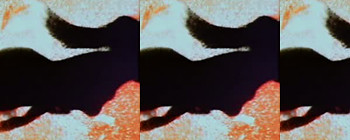
Rating: 2.5 Silhouetted Women
THE PLOT
14 months later...
It's a prisoner exchange! The bearded, gaunt Bond, for none other than Zao, with diamonds embedded deep in his skin, and an acidic hatred for the man who put them their in his soul. Now, Bond is not terribly glad to be free - he knew the risks, and hates that his freedom came at the expense of Zao being out in the world - and M (Judi Dench) quite tartly agrees, stripping his 00 status until it can be determined what happened while he was in prison. That's of only limited concern to the spy, who is anxious to capture the North Korean thug, and will do it under MI6's auspices or not, doesn't matter (further hints of Licence to Kill).
This leads Bond to Havana, where he meets the mysterious "Jinx" Johnson (Halle Berry), who turns out to also be after Zao, presently hiding out in a clinic that uses DNA replacement therapy to completely alter anyone's appearance - Zao himself is halfway through the process of being made to look Caucasian, a perfect disguise that would make him untrackable, if only Jinx hadn't blown things up first (she proves to be an NSA agent). His curiosity piqued not only by this mysterious fighter, but also by the oddly-inscribed diamonds he finds in Zao's belongings, which he finds to have a tiny "GG" inscribed on them - the mark of foreign-born British billionaire Gustav Graves (Toby Stephens).
Now, I had not seen this movie in many long years, and I remembered hating it; up to around this point, I couldn't for the life of me figure out why (or rather, I didn't remember liking any of it nearly this much). Some of the dialogue and most of the exposition is awfully stiff, and Lee Tamahori's directing has already raised its obnoxious head - I'll have plenty to say of Mr. Tamahori's work soon enough - but it's a reasonably interesting and fast-paced riff on the Licence to Kill scenario that, unlike Licence to Kill, doesn't feel like it's abandoned being a Bond movie.
The moment things change is after the break-out from the clinic, when all of a sudden it becomes clear that after 50 minutes, we really haven't even tasted the plot yet; it's just been a big long intake of breath, the movie flexing its muscles for the actual conflict about to begin. Setting aside my general mistrust of false first acts, Die Another Day suffers for a much greater reason: the plot, when it happens, is fucking goddamn nightmare awful. I'm sorry, that was a touch extreme. It's hard to say when the unforgivable twist happens: if it's when an unofficially reinstated Bond gets his invisible car from Q (John Cleese), or if it's when Graves is introduced skydiving to "London Calling", a perfectly wonderful song that should never, ever, in all of history, have been found in a James Bond movie. Anyway, this sleeker variant on Licence to Kill quickly becomes a cloddish re-do of Moonraker, because it turns out that Graves, from his remote Icelandic ice palace, is preparing a huge space laser that reflects the sun's light and destroys everything; and he doesn't even have the decency to hold the world for ransom to do this, but is motivated by sheer mad revenge: for it turns out that Graves is none other than Col. Moon, on the backside of the same kind of makeover surgery that Zao was unable to complete.
I have glided over the many scenes in between "London Calling" and "race against the sun-laser, controlled by a giant vest that Graves has to wear for some reason", but they are the meat and potatoes of why the film is so grindingly bad: a long, pointless stopover in a fencing club; a long, pointless waiting game in the ice castle for everybody - including, as our last principal, Rosamund Pike as Miranda Frost, Graves's assistant who is secretly an MI6 agent who is secretly a traitor - to start fighting and not just wonder when the sun-laser is going to happen. A long pointless stopover altogether, in fact, reminding one of the very worst of the Moore years only magnified, and thrown into harsh relief by the general success of the opening part.
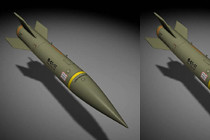
Rating: 1.5 Stolen Nukes
THE VILLAIN
There's no actual reason for Graves to fail as a villain: the megalomaniac with a sci-fi weapon has been one of the Bond franchise's mainstays, and he gets an unusually warped backstory, which cannot possibly hurt. But to his misfortune, he comes onto the scene almost at the exact moment that the film transitions from "okay, now, this is good" to "WHAT THE ACTUAL LIVING FUCK, I WANT MY MONEY BACK", and that makes it hard to not resent him a tiny bit. Besides, he's presented as, just, such a freaking tit: the character is meant to be an overgrown infant, basically, and that's legitimate, but not when it costs him gravity or plausibility as a foil for Bond. Especially in the scene where he and Bond have a fencing match - the first time we really get to see him in action, and as we know, first impressions are lasting impressions - where he comes across less as a genius bad guy, or even a hotheaded madman, and more as a bratty teenager who isn't used to not getting his way. Again, legitimate, but I don't have to enjoy watching it, nor Stephens's unbearably surface-level performance

Rating: 2 Evil Cats
THE GIRL
Halle Berry has exactly one setting - flirty and flippant - and it ceases to be interesting long before the movie is done. But she's still got more personality than a lot of Bond Girls, and she's sexually aggressive in a manner that is, I think, more empowering than the usual passive receptacles that 007 spends his time with. Besides which, Berry is lithe enough to be genuinely convincing as an action hero - after Wai Lin from Tomorrow Never Dies, Jinx is the most action-ready of all Bond Girls - and in general, her shallowness as a character makes her a credible "Female James Bond", not just an under-written character. It's definitely not the best performance that Berry was capable of giving, and it reflects poorly on the first-ever Oscar-holding Bond Girl (she won, in fact, during the shoot of Die Another Day) that she's so aggressively one-note. Or that she has such outrageously poor chemistry with her co-star.

Rating: 3 White Bikinis
THE HENCHMAN
It's surely no coincidence that the movie is better when it's chasing Zao than when it's fighting his loopy boss. For to start, he's an awfully fun Bond villain: visually distinctive (almost too much so; the half-white effect is more weird than it is ominous), with a good firm footing in the plot that gives him more depth than just some random menace Bond has to punch.
Pity, then, that when we see him after Cuba, he appears to have been thoroughly denuded of any character, turning into just "the guy with diamonds in his face", nothing at all more than the hired muscle that have stood menacingly behind so many megalomaniacs before him. It's a terrible fall for a strong villain, one that ends up making me like him a touch less, honestly, than if he'd started out lame and stayed that way.

Rating: 2.5 Metal-Plated Teeth
THE SECONDARY GIRL WHO ENDS UP DEAD
Rosamund Pike! I had completely forgotten that she was involved with this film, and boy, was it the highlight of my viewing experience when she first showed up. For what we know now, as we did not in 2002, that there is absolutely nothing which is not enhanced by her presence, even if it is not fixed; and "bettering something without fixing it" describes her work in Die Another Day to a T.
Admittedly, Miranda Frost, who turns out to be a villain, is maybe a disingenuous choice for this part, but I don't care, because: Rosamund Pike. Anyway, she's better-written than most of the other characters in the movie, even if the bulk of the work has been done by her name - she's a frigid professional who doesn't want to sleep with Bond, until we find out that she does, for reasons that turn out to be nefarious. Which gives her at least one and a half more layers than Graves. She's also responsible for virtually every decent line in the back half of the movie (she gets to be the first person in the whole franchise, I believe, to describe Bond with the classic Fleming phrase "blunt instrument"), and even if her banter with Brosnan has deliberate anti-chemistry, it's still fun to watch.
Most importantly: Rosamund freaking Pike.

Rating: 4 Golden Corpses
ACTION SEQUENCES
Well, the hovercraft chase is awesome.
As for the rest of it, there's nothing, and I mean nothing, that isn't at least semi-humiliating. Frequently, the "semi-" in that construction is just diplomacy on my part: even at the lowest degradations of the Roger Moore years, I don't know that anything reaches the godawful depths of Bond kite-surfing on a CGI wave, dodging CGI icebergs - the first major CGI-driven setpiece in the franchise, and the only argument we need for why they pretty much went immediately back to doing as much practically as they could in the next picture.
It's the low point of a film where that's a damned competitive race: the swordfight between Bond and Graves is epically bad, like the choreography consisted entirely of "Okay Toby, swing your sword at Pierce", or a fist-fight around a laser-based torture device that is going crazy shooting everywhere like a torture porn set in a rave club. I just... want to forget it. All of it.

Rating: 1.5 Walther PPKs
GADGETRY
One, perhaps inevitably, comes at this with a sense of grave suspicion: "prove it to me", one says to the film, "prove that there can still be gadgets and Q without the late, deeply lamented Desmond Llewelyn". John Cleese, though gratefully given far less wacky shit to do than he had in the last film, does not prove it, and that is only partially because he has the spectacularly unenviable job of introducing Bond to his invisible fucking car. An Aston-Martin Vanquish, "we call it the 'Vanish'", well ho ho, Q, you goddamn dick. Unlike a lot of people, I don't straight-up hate the concept of Bond having an invisible car, though I certainly do not like it very much; my bigger problem is that Q tries to sell the notion with this complicated sciencey explanation, instead of just saying, "you have an invisible car. Hit this button, it goes invisible, because we have magic now", and spared us all the embarrassment.
Also, a ring that makes bulletproof glass shatter, and is, admittedly, used in the only decent moment of the entire "blow up the ice castle" finale.
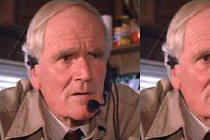
Rating: 1.5 Easily-Riled Welshmen
THE FIENDISH LAIR (and other sets)
Finally, Peter Lamont is given a chance to be good and gaudy, first in a little way (the colorful, shiny, unbelievably tacky DNA therapy clinic), and once in a great, grand, huge way, the giant ice fortress in the middle of nowhere, a huge, giddily impossible collection of shiny surfaces and ice-themed details. It is ludicrous, without a doubt, but that's just the way these unbelievable villainous hide-outs are meant to be.
And yet- the rest of the film is heavily realistic, with a resolutely domestic tang to many of the sets (the battered Underground station that makes up Q's lab, the warm, wood-covered fencing club, and so on. Which maybe is supposed to make the ice castle look that much more impressive for the contrast, but it sort of makes it feel like an artifact from an entirely different movie.

Rating: 3.5 Volcano Fortresses
ELEGANT LIFESTYLE PORN
It starts off so well: Bond, half-naked and hairy, stumbles into a Hong Kong hotel where the manager knows him, and tosses off a collection of idle comments about the clothes and drink he requires to be at his most perfect, seeming like the suavest motherfucker in the room even when he has the overall appearance of an especially slovenly bum; mere minutes later, he's chatting about the minutiae of cigar manufacturing like he was born in a tobacco patch.
And there it ends. Brosnan, playing his fourth distinct iteration of Bond in four movies, is clearly going for a short-tempered, angry sort this time around - the closest he's yet come to the Dalton Bond in what is, ironically, far and away the most Mooreish script he was ever given - and even when he's having arbitrary sex with Halle Berry or uncomfortable, awkward sex with Rosamund Pike, he just doesn't appear to be enjoying himself very much. Even his one vodka martini appears to strike him as an obligation, not a pleasure.

Rating: 2.5 Vodka Martinis
APPEARANCE OF "BOND. JAMES BOND."
At the fencing club, Bond introduces himself to Graves and Frost. "Bond", he says - Frost looks so expectant that she's almost leaning forward. "James Bond". She relaxes.
Forced or Badass? Like Roasamund Pike, I too nearly lean out of my seat waiting for the iconic line in every picture; unlike her, I do not threaten to turn it into a joke. Forced.
BEST QUIP
MOON: "You will not live to see the day all Korea is ruled by the North."
BOND: "Then you and I have something in common."
ADDITIONAL COMMENTS
Die Another Day came out three years and ten days after its most recent predecessor; the second-longest gap between films in the franchise's history, and the longest to occur in a single actor's continuous tenure as 007. At the time, it was easy to hope that this extra time was going to be spent getting back on course after The World Is Not Enough; and insofar as Die Another Day is, in some ways, and just barely on the whole, a better film than TWINE, that hope was fulfilled. But I don't think anyone was holding out for incrementalism: we were holding out for an actual good Bond movie, something to finally pay off the promise of GoldenEye.
Instead, we got 133 minutes of an old Bond for a new century, in which 50-year-old Brosnan, just starting to show his age (he had already, with the last film, become the second-oldest Bond ever), has to share time with an amazing glut of awful CGI, just unspeakably awful, not the kind that doesn't hold up, but the kind that, even in 2002, looked a half-decade or more out of date (if anything, as our expectations early-'00s the-century effects work have lowered, that iceberg surfing scene looks not quite as obnoxious as it felt then). And with the kind of directing that just reeks of its desperation to be stylish and hip, courtesy of the man who would grace us with the wretched Nicolas Cage vehicle Next just a few years down the road. In fact, while not dismissing its shortcomings as a dramatic narrative, the biggest problem with Die Another Day is surely the director's insane ideas about how to film it: first comes weirdly abstract transitions in the beginning, when Bond is groggy from his captivity; and then there's the slow-motion, and the speed ramping - all the speed ramping! I prefer my Bond action to be light on slow-motion, generally, but anything can be withstood if it is done well. But speed ramping (which, for the unintiated: when the shot abruptly speeds up or slows down and goes back to normal all in the same image, AKA "how Zack Snyder would shoot a breakfast cereal commercial").
While I appreciate that Tamahori actually cares about the action in the movie, something that was not apparently true of Michael Apted in TWINE, he goes about showing it in the most dubious possible way, turning the noble machine of a James Bond adventure into a demo reel that bears more similarity to a particularly ill-made hip hop video than an entry in the franchise that did so much to define what a state-of-the-art action picture looked like over the preceding 40 years.
Oh, the preceding 40 years. That's worth touching on, I guess. Die Another Day was the 40th anniversary Bond release, and the 20th in the Eon Productions canon; two landmarks that made it worth commemorating the series history, beyond a doubt. But where the 50th anniversary film, Skyfall, purports to do this by re-imagining so much of the history of Bond with fresh ideas filtered through tradition, Die Another Day just humps the corpse of the preceding 19 movies, in the form of a non-stop litany of in-jokes: the poison-tipped shoes from From Russia with Love; a quote lifted from Goldfinger; riding cars out of a plane, a stunt from The Living Daylights, a golden eye in the credits sequence; and most famously Halle Berry's entrance, straight out of Dr. No. Just for starters. And if that list got a touch boring to read, then I have successfully captured the way that the constant winks ("your twentieth [watch], I believe?") do not revivify the spirit of James Bond, but embalm it.
And then, there's the more basic, "god that sucked" stuff: Madonna's hilariously bad cameo as fencing instructor Verity, or the way that Samantha Bond's Moneypenny is given her last bow in a cheap joke of a scene that doesn't even make sense, given the logic that the film has previously established for a dumb VR rig that, presumably, is not also a sex simulator. Or Brosnan's sullen, angry performance, not so painfully disaffected as he was in Tomorrow Never Dies, but no more fun to watch. If I still prefer it to TWINE, that's mostly because it works for much longer at a much higher level before it dives off the cliff of invisible cars and CGI icebergs and sun guns and terrible sword fights and sex in a pile of diamonds much too big to possibly be comfortable.
"James Bond Will Return", we were promised as always, and he did - but thankfully, it would be after the series had been given a good long timeout in the corner to think about how naughty it was being; and the triumph of its return was good enough to make the apocalypse of the latter Brosnan movies nothing but a distasteful memory.
OVERALL SCORE
29/60
Categories: action, british cinema, crimes against art, james bond, spy films, thrillers

